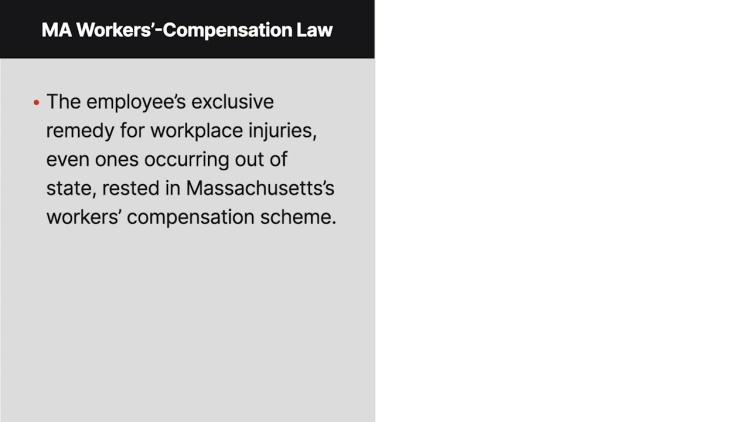Pacific Employers Ins. Co. v. Industrial Acc. Comm'n
United States Supreme Court
306 U.S. 493 (1939)

- Written by Denise McGimsey, JD
Facts
A Massachusetts resident who was employed in Massachusetts by Dewey & Almy Chemical Company (Dewey) was temporarily sent to Dewey’s California branch to act in an advising capacity. The employee was injured while in the course of his employment in California. He sought compensation from California’s Industrial Accident Commission (California Commission) (plaintiff) pursuant to California’s workers’ compensation law (California Act). The California Commission directed Dewey’s insurance carrier, Pacific Employers Ins. Co. (Pacific) (defendant), to pay the amounts prescribed by the California Act. In response, Pacific argued that the employee’s compensation should be determined by Massachusetts’ workers’ compensation law (Massachusetts Act). The California Act purported to provide an exclusive remedy for injuries occurring in California and precluded an employer from exemption thereunder by reason of any contract, rule, or regulation. The Massachusetts Act purported to provide an exclusive remedy for injuries to employees of Massachusetts companies, even where injury occurred out of state. The California Supreme Court decided in favor of the California Commission, stating that California public policy would be offended if California medical personnel were forced to seek reimbursement from another state for treatment of an injury in California. Pacific petitioned the United States Supreme Court for certiorari.
Rule of Law
Issue
Holding and Reasoning (Stone, J.)
What to do next…
Here's why 907,000 law students have relied on our case briefs:
- Written by law professors and practitioners, not other law students. 47,100 briefs, keyed to 996 casebooks. Top-notch customer support.
- The right amount of information, includes the facts, issues, rule of law, holding and reasoning, and any concurrences and dissents.
- Access in your classes, works on your mobile and tablet. Massive library of related video lessons and high quality multiple-choice questions.
- Easy to use, uniform format for every case brief. Written in plain English, not in legalese. Our briefs summarize and simplify; they don’t just repeat the court’s language.





